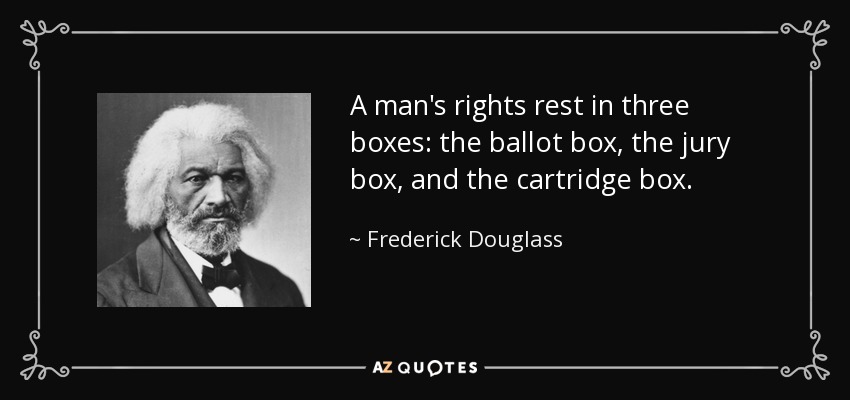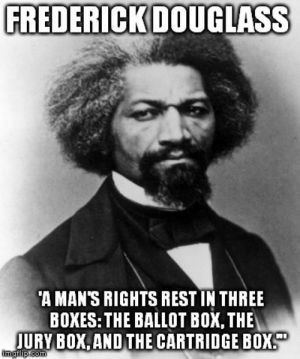By Dan Mitchell
When I wrote about race and gun control two years ago, I included five short videos to help show the value of the 2nd Amendment for minorities.
For today’s column on the same topic, we’ll start with this full-length video.
If you don’t have time to watch the video, one of the key messages is that gun control has a racist history, both in principle and in practice.
Gun control was used to make it difficult for freed blacks to own guns after the civil war. And gun control was used to hassle and intimidate blacks during the battle for civil rights last century.
That’s the bad news.
The good news is that civil rights for gun owners have been expanding in the United States.
And the latest issue of the U.K.-based Economist has an article that looks at the growth of gun ownership specifically among minorities.
Annette Evans…is Chinese-American, lives in the suburbs of Philadelphia and identifies herself as socially liberal—not the archetypal conservative, rural white man. Yet she owns over a dozen rifles, pistols and shotguns (“one for every occasion, like purses or shoes”) and teaches self-defence courses to women. …Of the 7.5m Americans who bought firearms for the first time between January 2019 and April 2021—as gun-buying surged nationwide—half were female, a fifth black and a fifth Hispanic, according to a recent study… The share of black adults who joined the gun-owning ranks, 5.3%, was more than twice that of white adults. …Blacks have a long history of owning guns: Harriet Tubman toted them, Martin Luther King kept them at home. …The broadening tent is good for manufacturers and bad for gun-control advocates.
Not everyone is happy about this expansion of civil liberties.
In a column for National Review, David Harsanyi reviews a book that makes a twisted argument about the 2nd Amendment.
Left-wing academic Carol Anderson’s new book, The Second: Race and Guns in a Fatally Unequal America, is all over the news. “The Second Amendment is not about guns — it’s about anti-Blackness, a new book argues,” reads a CNN headline. …This is wishful thinking. The Second is an attempt — much like the 1619 Project — to reimagine history in purely racial terms. The result is tendentious polemic that suffers not only from a paucity of historical evidence, but from a dishonest rendering of the facts we do know. …This is a contention that isn’t backed by a single contemporaneous quote or piece of hard evidence in the book. …Anderson ignores the tradition of militias in English common law — codifying the “ancient and indubitable” right in the 1689 English Bill of Rights — which had nothing to do with chattel slavery. Anderson ignores the fact that nearly every intellectual, political, and military leader of the Founding generation — many of whom had no connection to slavery — stressed the importance of self-defense in entirely different contexts.
Opining for the Boston Globe, Jeff Jacoby explains why gun control is a civil rights issue, notwithstanding the ACLU’s moral blindness.
The American Civil Liberties Union caused some double takes last Sunday with a tweet blaming racism and “anti-Blackness” for the presence of the Second Amendment in the Constitution. It was jarring to see the ACLU, once an indomitable champion of the Bill of Rights, endorse the revisionist view that one of its core components, the right to keep and bear arms, exists for malevolent racial reasons. …the real racism associated with the Second Amendment isn’t in the rights of gun ownership that the Bill of Rights cemented into the Constitution’s text. It is in the long and shameful record of those rights being denied. …In blatant disregard of the Second Amendment’s guarantee, Southern states enacted laws prohibiting Black people, enslaved and free alike, from owning firearms. …After the Civil War, racists continued to use gun control as a tool of white supremacy. …The most notorious of those gun-control posses called itself the Ku Klux Klan. …A favorite formulation of Frederick Douglass was that if Black people were to be really free, “they must have the cartridge box, the jury box, and the ballot box to protect them.”
Amen.

Olivia Rondeau and Hannah Cox (narrator of the above video), in an article for the Foundation for Economic Education, also point out that gun control has a racist history.
The Second Amendment has indeed been selectively upheld throughout our nation’s history, with gun control frequently being used to block black Americans from accessing their right to self-defense. Additionally, enforcement of gun control laws has been discriminatory, and the rhetoric around guns has often framed black people as a threat. …black people were prohibited from owning guns under the “Slave Codes” and “Black Codes.” …in the 1870s, racists in power turned to the use of “facially neutral laws” to continue blocking black people from gun ownership. …They used things like police-issued licenses, permit laws, and business and transaction taxes on guns that disproportionately affected black people, thus successfully disarming them. …By no means was this the end of discriminatory gun control laws or enforcement in our country. To date, black Americans are more likely than any other group to suffer the adverse impacts of gun control laws.
Last but not least, Jacob Sullum adds his two cents, writing for Reason about how gun control is bad news for minorities.
Progressive politicians nowadays overwhelmingly oppose pot prohibition and criticize the war on drugs, in no small part because of its bigoted origins and racially skewed costs. Yet they overwhelmingly favor tighter restrictions on guns, even though such policies have a strikingly similar history and contemporary impact. Drug control and gun control are unjust because they criminalize conduct that violates no one’s rights, which erodes civil liberties, contributes to mass incarceration, and unfairly imposes lifelong restrictions on millions of Americans. …Both types of policies have long targeted racial and ethnic minorities, at first explicitly and later in practice. …”The historical record provides compelling evidence that racism underlies gun control laws—and not in any subtle way,” historian Clayton Cramer noted in a 1995 Kansas Journal of Law and Public Policy article. “Throughout much of American history, gun control was openly stated as a method for keeping blacks and Hispanics ‘in their place,’ and to quiet the racial fears of whites.”
Since the War on Drugs is wasteful and inane, I obviously have no problem with Sullum’s analogy.
P.S. If you like feel-good stories about racial harmony (and assuming you’re not Michael Bloomberg), click here.
P.P.S. As illustrated by columns from Charles Blow and Danielle King, a growing number of African-Americans are embracing gun ownership.

